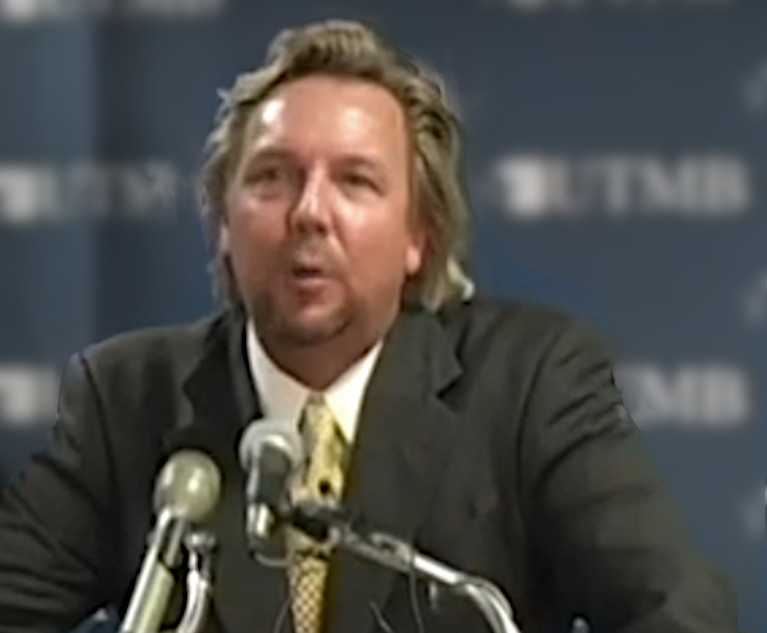Apache Corp.'s In-House Counsel Accused of Retaliating Against Paralegal; Appeal Planned
One big dispute at this point is a $767,242 attorney fee award, plus $100,000 for appellate fees, that a jury awarded to plaintiff Cathryn Davis from the multinational oil and gas exploration and production company.
April 22, 2019 at 01:49 PM
4 minute read
 Oil and gas drilling. Photo: pan demin/Shutterstock.com
Oil and gas drilling. Photo: pan demin/Shutterstock.com
In the case of a former paralegal who alleged an in-house lawyer at Apache Corp. discriminated and retaliated against her, the company plans to file its arguments with the Texas Supreme Court.
One big dispute at this point is a $767,200 attorney fee award, plus $100,000 for appellate fees, that a jury awarded to plaintiff Cathryn Davis from the multinational oil and gas exploration and production company. It was the only issue Apache partially won on appeal, by convincing Houston's Fourteenth Court of Appeals to subtract $62,100 because one attorney worked fewer hours than he was awarded and didn't keep sufficiently detailed billing records.
Apache's lawyer thinks the fee award is still too high. Davis won $150,000 in actual damages, which wasn't much more than the company had offered to settle, explained John Zavitsanos, partner in Ahmad, Zavitsanos, Anaipakos, Alavi & Mensing in Houston. The Fourteenth Court's opinion said Apache offered $110,000 to settle.
“This case seems to create a perverse incentive for lawyers to push a case forward when a fair offer is made,” he said, adding that another major issue is whether the jury charge erroneously “homogenized” Davis' two claims for age discrimination and retaliation.
But Houston solo practitioner Scott Newar, who represents Davis, wrote in an email that the fee award undercompensated the lawyers, who had to file nine motions to compel during discovery.
“Apache engaged in 'scorched earth' discovery tactics designed to exhaust Davis' limited resources,” he said, adding that the case is noteworthy since it was the three top attorneys in Apache's own in-house legal department who retaliated against her. “The jury's verdict and the appellate court's opinion send the clear message that no one, but, especially, not high-powered lawyers of a Fortune 500 corporation, is above the law.”
The April 4 opinion in Apache Corp. v. Davis explained that Davis was 52 when Apache hired her in 2006 as a senior paralegal in the litigation department. In 2010, two younger paralegals received promotions. Davis raised the issue of a promotion in November 2010, and the department supervisor, Dominic Ricotta, responded with anger and mockery. Eventually the company updated Davis' title but didn't raise her salary.
Her relationship with Ricotta deteriorated, according to her pleadings. To try to escape, Davis applied for a lesser-paying paralegal job in another department but a younger employee got the position, Davis claimed. Next, Ricotta took responsibilities away from Davis and disapproved of her flexible work schedule because the company was pushing for workers' hours to conform with normal office hours. There was a new policy of getting advance approval for overtime hours, which Davis broke twice.
Davis wrote an email in December 2012 to make a complaint about age and gender discrimination, and Ricotta thereafter “shunned her, indicated he was angry with her, and stopped giving her any substantive work,” said the opinion. A lawyer within Apache's human resources department started investigating her complaint but notified Davis in January 2013 that it found no evidence of discrimination.
In January 2013, Ricotta terminated Davis' employment. Davis filed a charge with the Equal Employment Opportunity Commission for age discrimination and retaliation and received a right-to-sue letter. After a trial, a jury found that Apache didn't discriminate against her based on age. The jury found Davis engaged in misconduct, for which Apache could have discharged her, but the real reason was retaliation for filing her discrimination complaint. Davis won $150,000 in damages, $767,242 in attorney fees and $100,000 of conditional appellate fees.
Apache appealed and argued there was legally insufficient evidence Davis engaged in protected activity, that but-for causation was lacking, the jury charge was erroneous, and the attorney fees were unreasonable and unsupported by enough evidence.
The Fourteenth Court overruled all the arguments, except it did find a problem with one attorney's fees. His fees of $132,750 were unsupported by the evidence because he documented just 163 hours of work, but the trial court awarded fees for 265.50 hours. There was only enough detailed evidence of tasks and work descriptions to substantiate 124 hours of work, billed at $500 per hour, and so the court suggested a remittitur of $70,626.
Davis accepted that amount April 11.
Read the opinion here.
This content has been archived. It is available through our partners, LexisNexis® and Bloomberg Law.
To view this content, please continue to their sites.
Not a Lexis Subscriber?
Subscribe Now
Not a Bloomberg Law Subscriber?
Subscribe Now
NOT FOR REPRINT
© 2025 ALM Global, LLC, All Rights Reserved. Request academic re-use from www.copyright.com. All other uses, submit a request to [email protected]. For more information visit Asset & Logo Licensing.
You Might Like
View All

Eversheds Sutherland Adds Hunton Andrews Energy Lawyer With Cross-Border Experience
3 minute read
Ex-Marathon General Counsel Takes Legal Reins of Another Energy Company
Trending Stories
- 1'A Death Sentence for TikTok'?: Litigators and Experts Weigh Impact of Potential Ban on Creators and Data Privacy
- 2Bribery Case Against Former Lt. Gov. Brian Benjamin Is Dropped
- 3‘Extremely Disturbing’: AI Firms Face Class Action by ‘Taskers’ Exposed to Traumatic Content
- 4State Appeals Court Revives BraunHagey Lawsuit Alleging $4.2M Unlawful Wire to China
- 5Invoking Trump, AG Bonta Reminds Lawyers of Duties to Noncitizens in Plea Dealing
Who Got The Work
J. Brugh Lower of Gibbons has entered an appearance for industrial equipment supplier Devco Corporation in a pending trademark infringement lawsuit. The suit, accusing the defendant of selling knock-off Graco products, was filed Dec. 18 in New Jersey District Court by Rivkin Radler on behalf of Graco Inc. and Graco Minnesota. The case, assigned to U.S. District Judge Zahid N. Quraishi, is 3:24-cv-11294, Graco Inc. et al v. Devco Corporation.
Who Got The Work
Rebecca Maller-Stein and Kent A. Yalowitz of Arnold & Porter Kaye Scholer have entered their appearances for Hanaco Venture Capital and its executives, Lior Prosor and David Frankel, in a pending securities lawsuit. The action, filed on Dec. 24 in New York Southern District Court by Zell, Aron & Co. on behalf of Goldeneye Advisors, accuses the defendants of negligently and fraudulently managing the plaintiff's $1 million investment. The case, assigned to U.S. District Judge Vernon S. Broderick, is 1:24-cv-09918, Goldeneye Advisors, LLC v. Hanaco Venture Capital, Ltd. et al.
Who Got The Work
Attorneys from A&O Shearman has stepped in as defense counsel for Toronto-Dominion Bank and other defendants in a pending securities class action. The suit, filed Dec. 11 in New York Southern District Court by Bleichmar Fonti & Auld, accuses the defendants of concealing the bank's 'pervasive' deficiencies in regards to its compliance with the Bank Secrecy Act and the quality of its anti-money laundering controls. The case, assigned to U.S. District Judge Arun Subramanian, is 1:24-cv-09445, Gonzalez v. The Toronto-Dominion Bank et al.
Who Got The Work
Crown Castle International, a Pennsylvania company providing shared communications infrastructure, has turned to Luke D. Wolf of Gordon Rees Scully Mansukhani to fend off a pending breach-of-contract lawsuit. The court action, filed Nov. 25 in Michigan Eastern District Court by Hooper Hathaway PC on behalf of The Town Residences LLC, accuses Crown Castle of failing to transfer approximately $30,000 in utility payments from T-Mobile in breach of a roof-top lease and assignment agreement. The case, assigned to U.S. District Judge Susan K. Declercq, is 2:24-cv-13131, The Town Residences LLC v. T-Mobile US, Inc. et al.
Who Got The Work
Wilfred P. Coronato and Daniel M. Schwartz of McCarter & English have stepped in as defense counsel to Electrolux Home Products Inc. in a pending product liability lawsuit. The court action, filed Nov. 26 in New York Eastern District Court by Poulos Lopiccolo PC and Nagel Rice LLP on behalf of David Stern, alleges that the defendant's refrigerators’ drawers and shelving repeatedly break and fall apart within months after purchase. The case, assigned to U.S. District Judge Joan M. Azrack, is 2:24-cv-08204, Stern v. Electrolux Home Products, Inc.
Featured Firms
Law Offices of Gary Martin Hays & Associates, P.C.
(470) 294-1674
Law Offices of Mark E. Salomone
(857) 444-6468
Smith & Hassler
(713) 739-1250







